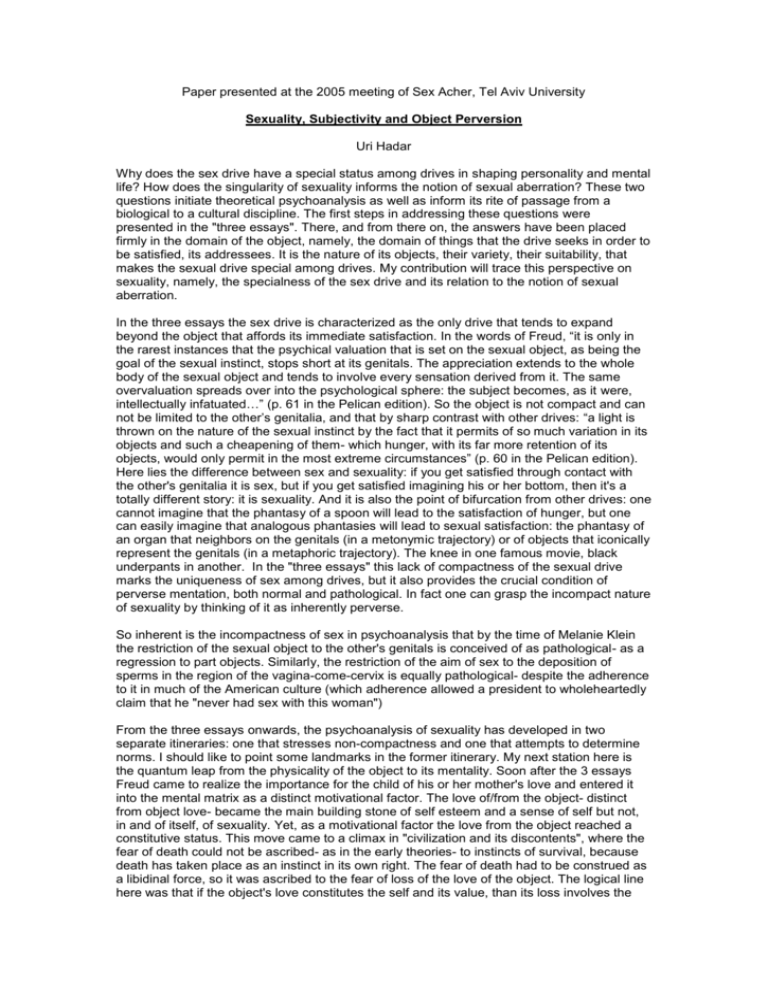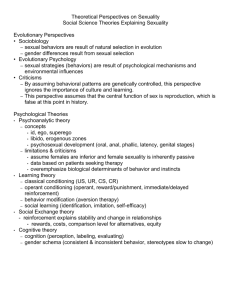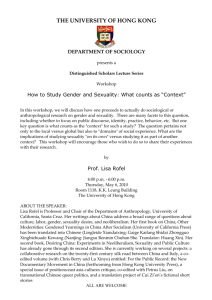
Paper presented at the 2005 meeting of Sex Acher, Tel Aviv University
Sexuality, Subjectivity and Object Perversion
Uri Hadar
Why does the sex drive have a special status among drives in shaping personality and mental
life? How does the singularity of sexuality informs the notion of sexual aberration? These two
questions initiate theoretical psychoanalysis as well as inform its rite of passage from a
biological to a cultural discipline. The first steps in addressing these questions were
presented in the "three essays". There, and from there on, the answers have been placed
firmly in the domain of the object, namely, the domain of things that the drive seeks in order to
be satisfied, its addressees. It is the nature of its objects, their variety, their suitability, that
makes the sexual drive special among drives. My contribution will trace this perspective on
sexuality, namely, the specialness of the sex drive and its relation to the notion of sexual
aberration.
In the three essays the sex drive is characterized as the only drive that tends to expand
beyond the object that affords its immediate satisfaction. In the words of Freud, “it is only in
the rarest instances that the psychical valuation that is set on the sexual object, as being the
goal of the sexual instinct, stops short at its genitals. The appreciation extends to the whole
body of the sexual object and tends to involve every sensation derived from it. The same
overvaluation spreads over into the psychological sphere: the subject becomes, as it were,
intellectually infatuated…” (p. 61 in the Pelican edition). So the object is not compact and can
not be limited to the other’s genitalia, and that by sharp contrast with other drives: “a light is
thrown on the nature of the sexual instinct by the fact that it permits of so much variation in its
objects and such a cheapening of them- which hunger, with its far more retention of its
objects, would only permit in the most extreme circumstances” (p. 60 in the Pelican edition).
Here lies the difference between sex and sexuality: if you get satisfied through contact with
the other's genitalia it is sex, but if you get satisfied imagining his or her bottom, then it's a
totally different story: it is sexuality. And it is also the point of bifurcation from other drives: one
cannot imagine that the phantasy of a spoon will lead to the satisfaction of hunger, but one
can easily imagine that analogous phantasies will lead to sexual satisfaction: the phantasy of
an organ that neighbors on the genitals (in a metonymic trajectory) or of objects that iconically
represent the genitals (in a metaphoric trajectory). The knee in one famous movie, black
underpants in another. In the "three essays" this lack of compactness of the sexual drive
marks the uniqueness of sex among drives, but it also provides the crucial condition of
perverse mentation, both normal and pathological. In fact one can grasp the incompact nature
of sexuality by thinking of it as inherently perverse.
So inherent is the incompactness of sex in psychoanalysis that by the time of Melanie Klein
the restriction of the sexual object to the other's genitals is conceived of as pathological- as a
regression to part objects. Similarly, the restriction of the aim of sex to the deposition of
sperms in the region of the vagina-come-cervix is equally pathological- despite the adherence
to it in much of the American culture (which adherence allowed a president to wholeheartedly
claim that he "never had sex with this woman")
From the three essays onwards, the psychoanalysis of sexuality has developed in two
separate itineraries: one that stresses non-compactness and one that attempts to determine
norms. I should like to point some landmarks in the former itinerary. My next station here is
the quantum leap from the physicality of the object to its mentality. Soon after the 3 essays
Freud came to realize the importance for the child of his or her mother's love and entered it
into the mental matrix as a distinct motivational factor. The love of/from the object- distinct
from object love- became the main building stone of self esteem and a sense of self but not,
in and of itself, of sexuality. Yet, as a motivational factor the love from the object reached a
constitutive status. This move came to a climax in "civilization and its discontents", where the
fear of death could not be ascribed- as in the early theories- to instincts of survival, because
death has taken place as an instinct in its own right. The fear of death had to be construed as
a libidinal force, so it was ascribed to the fear of loss of the love of the object. The logical line
here was that if the object's love constitutes the self and its value, than its loss involves the
loss of self, involves death. In the 1950s, Lacan has re-entered this idea into the analysis of
sexuality as such: desire, he said, is always for the desire of the other. Sexuality not only
incorporates the wish of the other but is actually predicated upon it. What we want when we
desire is for the other to want us. The object has taken here- I think for the first time in
psychoanalysis- its position as a subject. Lacan, in that sense, is the first radical
intersubjective thinker. Note that the Lacanian shift to the other implies a shift from the notion
of drive to the notion of desire and wish, but this shift is not so revolutionary. It featured in 17th
century discussion of physical forces (push versus pull) and is inherent in the legend of the
Sirens and their irresistible singing.
This intersubjective perspective on sexuality totally transforms the notion of object perversion:
it now must relate to manipulation of the desire of the other- especially the attempts to
eliminate it as constitutive of sexuality- rather than any physical or genderial characteristics of
the object. Of course, desire for non-human objects- animate or inanimate- will still be
considered perverse (by virtue of eliminating the other's desire). Similarly, rape will be
considered perverse- even the paradigmatic perversion- but not homosexual or sadomasochistic practices. At the same time, we'll have a whole range of very ordinary sexual
practices that incorporate perverse mentation, the need or wish to remove from our sexual
imagination the desire of the other. To be provocative, the whole history of patriarchal notions
of sexuality promotes perverse practices, as does the wish to achieve orgasms. However, I
find the re-definiition of perversion here a bit tiresome and leave it at that.
The last landmark of the incompactcness project which I want to mention here is that of Jean
Laplanche. Laplanche takes the role of the other in sexuality a step further than Lacan: For
him sexuality is always already the desire of the other. The child first encounters sexuality
through the desire of adults. At the time of her first encounter, the child does not have the
mental apparatus to process this domain of mental representation and leaves it as a foreign
body. Sexuality at this stage does not connect to the rest of the child's psyche and remains
marked as 'other', as belonging with the other. In adolescence the subject has already the
required mental apparatus to decode the earlier contents, and this is his/her main route of
awakening sexuality. However, for Laplanche sexuality always retains its nature as belonging
to another. It is always given to expropriation by otherness. Sex preserves a core experienced
of it as uncanny, as threatening to the subject in one way or another.
Now, the problem with the above intersubjective formulations is that their notion of sexuality is
disembodied. For Freud the love of/from the object is distinct from sexuality because it is
disembodied, while sexuality is always embodied. This remains a problem for the
incompactness project. However, it is this project that Lacan sums up by saying that a sexual
relation is impossible. It is impossible, firstly, because the sex drive always expands beyond
the strictly sexual, beyond genitalia; secondly, this line of thought necessarily leads to
extending sexuality beyond the body, indeed, even beyond sex; and thirdly, sexuality is
always given to confiscation, to losing its subject. Fortunately, of course, this also means that
sexuality can not be exhausted, it is inherently indefatigable. Which is nice.









